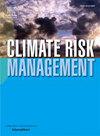From climate risk to action: Analysing adaptation decision robustness under uncertainty
IF 5
2区 环境科学与生态学
Q1 ENVIRONMENTAL SCIENCES
引用次数: 0
Abstract
Climate adaptation decisions are made under great uncertainty, arising from uncertainties about both the level of climate risk and the attributes of decision options. Decision-makers must understand how uncertainties in the input factors of risk assessment and decision models affect the ultimate adaptation decision, and whether the modelling yields a robust decision, i.e. one that is consistently identified as optimal over a range of uncertain input factors. Here, we present a framework for analysing the robustness of climate adaptation decisions. We apply a Bayesian Decision Analysis framework to determine the optimal output decision in a region based on both climate risk and decision-related attributes. Then, we present an approach for performing global uncertainty and sensitivity analysis on the optimal adaptation decision itself to assess robustness and understand which input factors most influence the decision in a particular region. We demonstrate this framework on an idealised example of adaptation decision-making to mitigate the risk of heat-stress on outdoor physical working capacity in the UK. In this application, we find that regions with high uncertainty in climate risk can still exhibit greater robustness in the optimal decision, and the decision is often more sensitive to variations in decision-related attributes rather than risk-related attributes. Previous research often stops short at assessing uncertainty and sensitivity in climate risk alone. These results highlight the necessity of conducting uncertainty and sensitivity analysis on the ultimate decision output itself in order to understand what factors drive decision robustness.
从气候风险到行动:不确定性下的适应决策稳健性分析
由于气候风险水平和决策选择属性的不确定性,气候适应决策是在很大的不确定性下做出的。决策者必须了解风险评估和决策模型的输入因素的不确定性如何影响最终的适应决策,以及建模是否产生稳健决策,即在一系列不确定的输入因素中始终被确定为最优决策。在这里,我们提出了一个框架来分析气候适应决策的稳健性。我们应用贝叶斯决策分析框架,在气候风险和决策相关属性的基础上确定一个地区的最优产出决策。然后,我们提出了一种对最优适应决策本身进行全局不确定性和敏感性分析的方法,以评估鲁棒性并了解哪些输入因素对特定区域的决策影响最大。我们在一个理想化的适应决策的例子上展示了这个框架,以减轻英国户外体力工作能力的热应激风险。在此应用中,我们发现气候风险不确定性较高的地区在最优决策中仍然表现出更强的鲁棒性,并且决策往往对决策相关属性的变化比风险相关属性的变化更敏感。以往的研究往往在评估气候风险的不确定性和敏感性方面止步不前。这些结果强调了对最终决策输出本身进行不确定性和敏感性分析的必要性,以便了解驱动决策鲁棒性的因素。
本文章由计算机程序翻译,如有差异,请以英文原文为准。
求助全文
约1分钟内获得全文
求助全文
来源期刊

Climate Risk Management
Earth and Planetary Sciences-Atmospheric Science
CiteScore
8.20
自引率
4.50%
发文量
76
审稿时长
30 weeks
期刊介绍:
Climate Risk Management publishes original scientific contributions, state-of-the-art reviews and reports of practical experience on the use of knowledge and information regarding the consequences of climate variability and climate change in decision and policy making on climate change responses from the near- to long-term.
The concept of climate risk management refers to activities and methods that are used by individuals, organizations, and institutions to facilitate climate-resilient decision-making. Its objective is to promote sustainable development by maximizing the beneficial impacts of climate change responses and minimizing negative impacts across the full spectrum of geographies and sectors that are potentially affected by the changing climate.
 求助内容:
求助内容: 应助结果提醒方式:
应助结果提醒方式:


